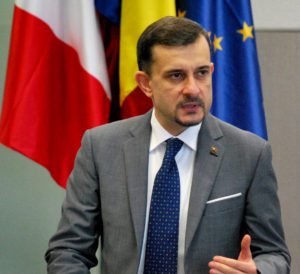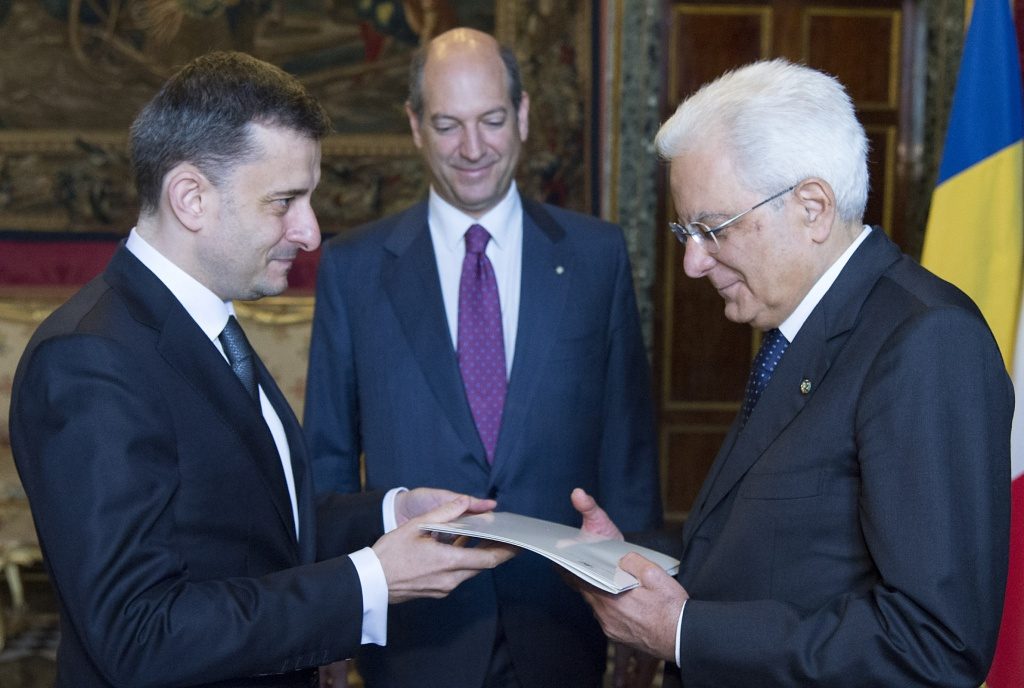 After an academic and journalistic career in Italy, you embrace the diplomatic career to take the responsibility to promote your country in Italy by acceding to the position of Ambassador of Romania in Italy, how do you apprehend this mission? How did your course serve you? What assessment can you make after two years?
After an academic and journalistic career in Italy, you embrace the diplomatic career to take the responsibility to promote your country in Italy by acceding to the position of Ambassador of Romania in Italy, how do you apprehend this mission? How did your course serve you? What assessment can you make after two years?
My story in Italy begins in 1996 when I arrived in Rome with a scholarship from the ”Pio Romeno” Pontifical College. Later, I had an experience as an accredited journalist to the Holy See, specializing in social communication, which offered me many reasons of professional satisfaction. I started my diplomatic career in 2003 at the Embassy of Romania in Rome, and then continued for four years as a general consul in Milan. This professional career justifies me to consider myself a Romanian “from the community”, allowing me to understand and even to feel what it means to be Romanian in Italy. Of course, it is a great honor for me to represent my country in Italy as an ambassador and, as such, I am trying to contribute both to further developing the strategic partnership between Romania and Italy and to consolidating the links between our country and the numerous community of Romanians living, working or studying in Italy. Two years after taking office as ambassador in Rome, I can say, based on the signals received from our Italian partners and from the Romanians in Italy, that we are on the right track.
Cultural and political relations between Romania and Italy date back to the 18th century. What is the climate of political and cultural relations today?
Your question gives me the opportunity to highlight the very rich history of the political, economic and cultural relations between Romania and Italy. Let’s not forget that this year we celebrate 145 years since the opening, in 1873, of the first Romanian diplomatic agency in Rome and 10 years of Consolidated Strategic Partnership. Starting with the very strong historical, cultural and linguistic links, the political relations between Romania and Italy have undergone numerous changes, the most important developments taking place starting with the 1990s.
During the last two decades, the bilateral relations have gained even greater intensity since the accession of our country to NATO and to the European Union. At political level, our countries have become partners and close allies, maintaining a constant and substantial dialogue at bilateral, European and international level, which contributed to further developing our very special bilateral relation.
It is not commonplace if we affirm that our countries are tied by a privileged relation: Romania is indeed the only country that bears Rome in its name, a constant testimony of our common history, which begins about two millennia ago and which, for our country, was a landmark also in the creation of the Great Union, whose centenary we are celebrating this year. The framework of the political and cultural relations is therefore very favourable for a substantive collaboration on issues of common interest, a central element to this being the interest of both countries to bring EU closer to citizens, so that collaboration at European level meets the real needs of citizens and helps increase solidarity between European partners.
At the same time, the economic relations between our countries confirm Italy as a strategic partner for Romania, the volume of trade reaching a record level in 2017.
Equally, our communities, of Romanians in Italy and Italians in Romania, represent a very important bridge, which contributes to deepening the Consolidated Strategic Partnership between the two countries.
You advocate Cultural Diplomacy, can you explain your approach?
We need public and cultural diplomacy to connect our foreign policy actions to citizens, in order to increase the level of participation within our societies and to address the challenges we face in a more integrated way. Through culture, we understand better the other and increase our capacity to adapt and overcome obstacles. That is why I believe that public and cultural diplomacy can represent the basis for all other diplomacy actions.
I firmly believe that cultural diplomacy helps us fight the prejudices that have often given rise to misunderstandings and develop a culture of trust, that constitutes the basis for a true cohesion policy. Culture contributes to the overall welfare and to the development of our societies, having an important human, social but also economic component. By systematically making use of cultural diplomacy actions, we make Romanian values known and, at the same time, we send a message of openness that contributes to knowing each other and to the enhancement of intercultural dialogue.
When Romania joined the European Union in 2007, trade relations between Romania and Italy grew, where are we today?
Economic and trade relations between Romania and Italy can be considered excellent, given that Italy is Romania’s second trading partner with a share of 10.8% of total Romanian foreign trade. At the end of 2017, the total value of Romania-Italy bilateral trade exceeded 14.61 billion euros, up 7.62% compared to 2016, the highest value in the last ten years. Moreover, this growth trend was also confirmed earlier this year, according to the latest data from the Romanian Ministry of Business, Commerce and Entrepreneurship. The trade balance is balanced, with a total value of Romanian exports of 7.03 billion euros, and imports of Italian products in Romania of 7.58 billion euros in 2017.
Italian companies are very interested in the Romanian market, in which they invested 2.36 billion euros during the previous year (Italy being, from this point of view, 6th among the top foreign investors) and where they have created a significant number of companies with Italian capital. With 23,446 active Romanian companies with Italian capital, Italy ranks first among the top foreign investors from this point of view.
What is the role of the Romanian Embassy in Italy in increasing economic and cultural relations?
Diplomatic action in the economic and cultural fields means building connecting bridges for identifying, promoting and defending common interests, and this is done both by promoting a dynamic and rich programme of contacts between the leaderships of our states and by stimulating economic and cultural collaboration at all levels, including through inter-human contacts.
I take advantage of this opportunity to highlight once again the importance of public diplomacy actions and their support in enhancing and strengthening economic and cultural relations, through the fact that each initiative of this kind is a message vector.
What are the major projects and objectives of your Embassy in the years to come?
Of course, the priority of the Romanian Embassy in Rome is the implementation of the foreign policy lines established by the Ministry of Foreign Affairs, taking into account the specificity of the special partnership relationship between our countries. From this point of view, our objectives are to strengthen the bilateral relationship, to further support the Romanian community in Italy – the largest foreign community in Italy and the largest community of Romanians abroad. We will also continue to promote Romanian culture in Italy, in collaboration with the specialized Romanian institutions in the Peninsula, always taking into account the role of culture of binder between individuals and societies. We will, for sure, have a loaded calendar in the first half of 2019, during Romania’s presidency of the EU Council; also in this case our priority will be to promote the principle of cohesion as a common EU value and to have the citizen in the foreground, with the aim of stimulating the active participation of citizens and rebuilding their trust in the European project, by returning to the foundations of the European construction and by enhancing the transparency of the decision-making process.
Finally, on the eve of major European elections, what message do you want to send to Italy, to Italians and to Romanians in Italy?
Italy is a founding state of the European Union and the tradition of Europeanism of its statespeople and thinkers is a source of inspiration and part of the common heritage. It’s enough to mention Alcide De Gasperi and Altiero Spinelli. De Gasperi said that politicians are only interested in the present, and people are always thinking of what they will leave to future generations. Europe needs a clairvoyant leadership that will give future generations the necessary framework for a safe and prosperous society, that is self-assured and inspires optimism and enthusiasm for the values that have made Europe grow and offer a chance to many of them.
Too bad that people’s memory is short and history is not being studied enough. Europe was the solution after two world conflagrations where millions died and where the suffering and the national pride suffocated the hopes of many. Through the European project, the old continent has become a space of welfare, where new political and economic platforms have been developed. It depends on our choices, what we want from the European Union, to become a political project that counts and a space of the future, or to yield to false messages that question the role and relevance of the EU, without knowingly recognizing the undeniable benefits that this project has brought to European citizens. On the threshold of the European elections, we have to ask ourselves “what Europe do we want?” And let us not ignore the meaning and importance of the values underlying this great human and political project.
We live indeed in an international context full of challenges, but these challenges do not come from nothing: they are the consequences of the choices that each of us makes. Therefore, my message to Italians, Romanians and Europeans in general, is to always have in mind the importance of their own choices and to try to see, when making a decision, the world we want to leave to our children. In the context of the anniversary of the Centenary of the Great Union of Romania, in 2018, I express my hope that each us will become aware of the power of unity and of the importance of providing an example, through our behavior, to future generations, just as the makers of the 1918 Romanians’ union have left us the model of involvement and of believing, that can change for good the fate of the people.


















